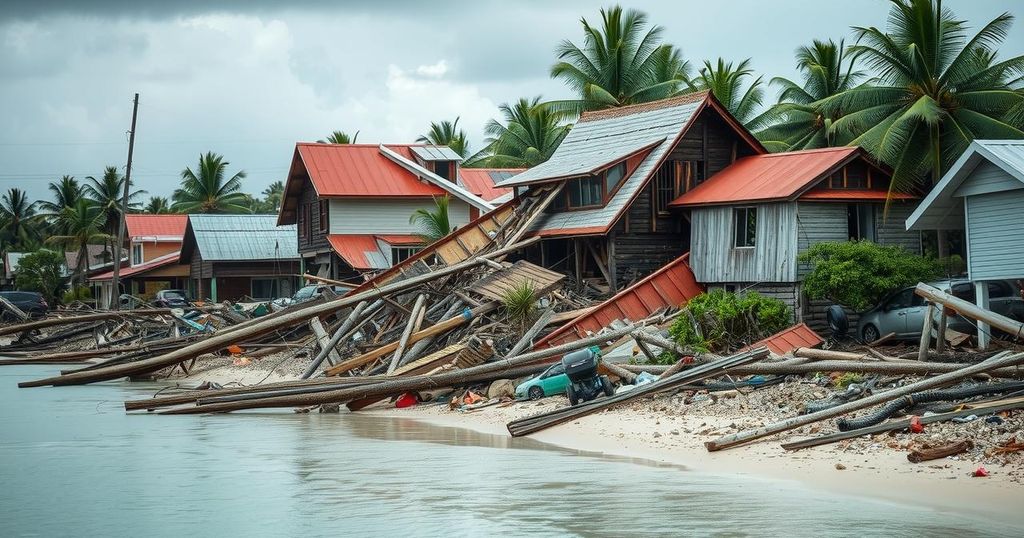Cyclone Chido has devastated Mayotte, resulting in fears of thousands dead. As rescue efforts unfold, officials report severe destruction, particularly in impoverished areas, with crucial infrastructure significantly impacted. The storm has raised concerns regarding climate change’s role in increasing storm intensity, highlighting the socio-economic vulnerabilities of the region.
Rescue operations commenced on Monday to assist the inhabitants of Mayotte, a remote French territory in the Indian Ocean, following the devastating impact of Cyclone Chido. This storm, characterized as the most severe to strike the region in nearly a century, has left officials alarmed at the potential loss of life, with fears that hundreds, possibly thousands, might have perished. Presently, the stated death toll stands at 14, but the estimates suggest a more tragic reality for the densely populated archipelago, which has approximately 300,000 residents.
The cyclone resulted in significant destruction, particularly in impoverished neighborhoods that were predominantly comprised of poorly constructed slum dwellings. French authorities have reported extensive damage to critical infrastructure, including airports and hospitals. Notably, damage to the control tower of the airport now permits only military aircraft to land, complicating the extensive rescue operations required. Additionally, power outages have affected the entire archipelago, exacerbating the crisis.
In response to the unfolding disaster, France has deployed rescue personnel, soldiers, and essential medical supplies from both the mainland and the neighboring French territory of Reunion. Despite being recognized as the poorest territory governed by a European Union nation, Mayotte remains a destination for economic migrants from surrounding impoverished regions, largely due to the benefits provided by the French welfare system. Furthermore, The French Red Cross has indicated that approximately 100,000 individuals reside in makeshift housing on Mayotte, most of which have been decimated by the cyclone.
Cyclone season commenced in the southwestern Indian Ocean at the beginning of December, with Chido making landfall as an intense tropical cyclone—akin to a category-4 hurricane—on the island of Madagascar on Sunday. Reports suggest that the intensity of Cyclone Chido may be linked to climate change, as while the frequency of these storms has remained stable, their severity has increased due to rising air and sea temperatures, which foster the conditions needed for more powerful storms.
The context surrounding Cyclone Chido involves its classification as the most catastrophic storm experienced by the territory of Mayotte in nearly a century, highlighting its severe impact on vulnerable populations. The cyclone’s severity, categorized similarly to a category-4 hurricane, underscores broader concerns about changes in climate patterns affecting storm intensity in the region. Additionally, the socio-economic landscape of Mayotte, characterized by poverty and inadequate infrastructure, significantly exacerbates the disaster’s toll on the local population. The region’s reliance on economic migrants also places additional stress on its already strained resources during such emergencies.
The aftermath of Cyclone Chido presents a humanitarian challenge for Mayotte, necessitating urgent and effective rescue responses to address the considerable loss of life and widespread destruction. The deployment of rescue teams from France and surrounding territories reflects international support, yet the scale of the disaster raises pressing concerns regarding future preparedness amid increasingly intense storms, potentially exacerbated by climate change. Addressing the vulnerabilities of Mayotte will be critical in mitigating the impacts of future cyclones and ensuring the resilience of its communities.
Original Source: www.cbsnews.com






